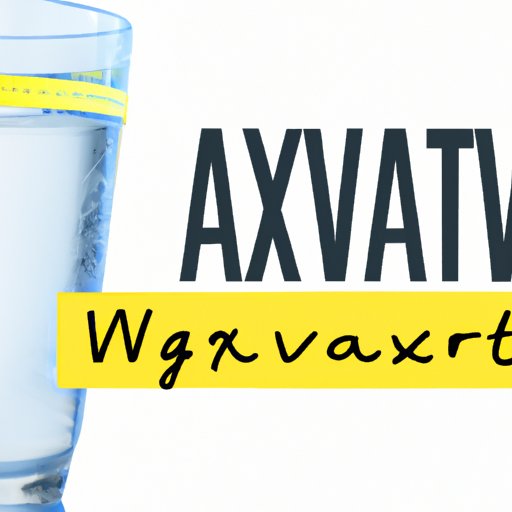
Introduction
People often wonder if drinking water can make them gain weight. It’s a valid question since water is vital for human survival and has no calories or fat content. However, there are several factors that can contribute to bloating, retention, and water weight, and these are often confused with actual weight gain. This article will explore the relationship between water intake and weight gain, the benefits of drinking enough water, the consequences of dehydration, the comparison between water and other beverages, tips, and tactics for increasing water intake, and the ideal amount of water to drink daily.
The Link Between Water Consumption and Weight Gain
There are many reasons why individuals may experience bloating or water retention. Some of the factors that cause water weight include hormonal changes, a high-sodium diet, and premenstrual syndrome (PMS). However, water weight is not fat weight, so drinking water alone doesn’t cause weight gain. Instead, drinking more water can signal your kidneys to release more water, reducing retention, and consequently, reducing your weight. Additionally, inadequate water intake can cause dehydration, causing temporary weight gain.
The Benefits of Drinking Enough Water
Drinking enough water has numerous benefits for the body, including aiding in weight loss and weight control. When you drink water, your body increases the number of calories it burns to warm up the water to body temperature. This thermogenic effect helps increase metabolism, and therefore helps burn more calories throughout the day. Drinking water also manages hunger and helps your body break down fat efficiently. Studies show that people who drink enough water have a higher resting energy expenditure and burn more calories than those who do not.
The Consequences of Dehydration for the Body
Dehydration can have several negative impacts on the body, such as impaired cognition, mood changes, and fatigue. Additionally, dehydration can contribute to temporary weight gain. Once your body becomes dehydrated, it holds on to any water it has, making you feel bloated and swollen. When you drink enough water, your body can flush out toxins more effectively, reducing water retention and avoiding bloating.
Water vs. Other Beverages
Choosing water over sugary drinks leads to numerous benefits for the body, including reduced calorie intake and maintaining a healthy weight. Sugary drinks like soda, energy drinks, and sports drinks are high in calories and provide little-to-no nutritional value. Consuming sugary drinks can lead to weight gain, type 2 diabetes, and other health issues. On the other hand, water doesn’t provide empty calories and can hydrate the body effectively. Studies show that individuals who drink more than one soda per day are at higher risk of becoming overweight or obese.
Tips and Tactics for Increasing Water Intake
Staying hydrated is essential for good health and daily activities. Adults should aim for at least eight cups of water per day. However, some people may need to drink more or less water based on their activity levels, weight, and surrounding temperature. Drinking water can also provide several benefits, such as improved skin health, weight control, and brain function. Here are some tips on how you can increase your water intake:
- Carry a reusable water bottle with you at all times and refill it frequently.
- Add natural flavors to your water by adding fresh mint, lemon, or cucumber slices.
- Drink water before, during, and after meals to help suppress your appetite.
- Consume fruits and vegetables that have high water content, like watermelon or cucumber.
- Download a water tracking app or set reminders on your phone to drink water.
The Ideal Amount of Water to Drink Daily
The ideal amount of water to drink per day varies based on sex, weight, age, and activity levels. According to the Institute of Medicine, men should drink at least 3.7 liters, and women should drink at least 2.7 liters of water per day. However, other methods are available to calculate your daily water intake, such as dividing your weight in half and drinking that number in ounces. Be sure to adjust your water intake based on surrounding temperature and your physical activity levels.
Conclusion
Drinking enough water can contribute to weight loss, improved digestion, and overall health. While there are several factors that can contribute to water weight and retention, drinking water and staying hydrated can alleviate these issues and lead to weight loss. Be sure to drink plenty of water and avoid sugary drinks, and you’ll be on your way to a healthier, happier you.




